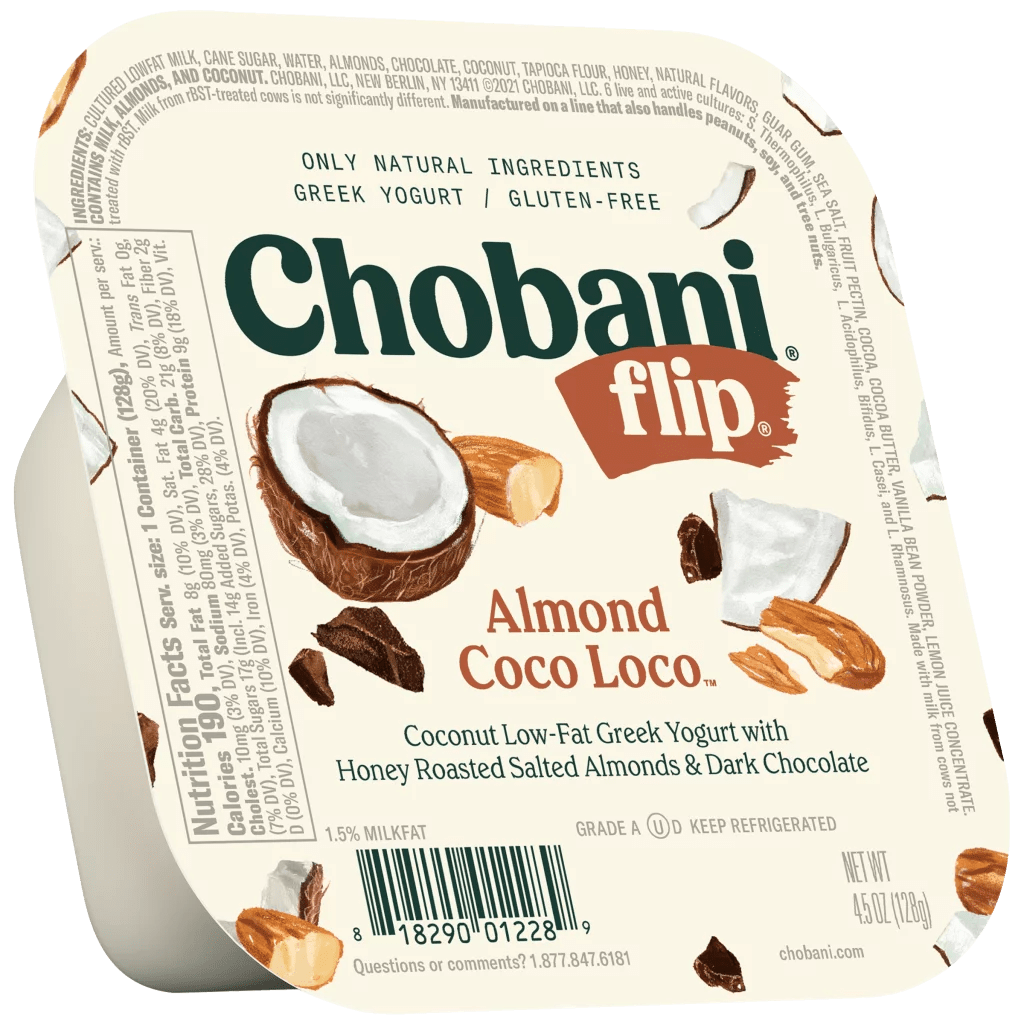Chobani Flips: a tempting combination of creamy yogurt and crunchy, sweet toppings. But are they truly a healthy snack or just a sugar bomb in disguise? This guide dissects the nutritional profile of Chobani Flips, exploring the protein and probiotic benefits while addressing the sugar content concerns. We’ll help you navigate the flavor maze, make informed choices, and discover how to enjoy these treats as part of a balanced diet.
Decoding the Nutrition Label: Protein, Probiotics, and Sugar
Chobani Flips are often marketed as a protein-packed snack, and they deliver on that promise, typically offering around 12 grams of protein per serving. This protein contributes to satiety, supports muscle growth and repair, and can be particularly helpful for those managing weight or aiming to increase muscle mass. They also contain probiotics, beneficial bacteria that play a crucial role in gut health, potentially improving digestion and boosting immunity. However, the sugar content can be a significant drawback.
The Sugar Story: How Sweet Is Too Sweet?
While protein and probiotics are definite advantages, the sugar content in Chobani Flips can vary dramatically. Some flavors contain close to 20 grams of sugar per serving—rivaling a candy bar. This added sugar, while tempting, might diminish the overall health benefits. So, are Chobani Flips actually healthy? The answer, as with many nutritional questions, is: it depends.
Navigating the Flavor Maze: Making Informed Choices
Choosing the right flavor is key to maximizing the health benefits of your Chobani Flip. Here’s a guide to help you make smarter choices:
| Flavor Category | Sugar (g) (approx.) | Protein (g) (approx.) | Dietitian’s Thoughts |
|---|---|---|---|
| Best Choices | 8-12 | 10-12 | These options prioritize natural sweetness from fruit, with minimal added sugar. Look for flavors featuring berries or citrus. |
| Moderate Choices | 13-17 | 11-13 | Enjoy these occasionally, but be mindful of the added sugar. Consider them more of a treat than an everyday snack. Flavors with cookie crumbles or chocolate often fall into this category. |
| Flavors to Limit | 18+ | 12-14 | Limit these due to the high sugar content, which may outweigh the protein and probiotic benefits. Many dessert-inspired flavors are in this category. |
Important Note: These are approximate values and may vary between products. Always check the nutrition label for accurate information.
Chobani Flips vs. The OG: A Nutritional Showdown
Plain, unsweetened Greek yogurt reigns supreme in terms of nutritional value. It’s naturally lower in sugar and provides a versatile base for creating customized snacks. While Chobani Flips offer convenience, the added sugar and other ingredients can tip the balance.
DIY Delight: Creating Your Own Healthy Flips
Want the flavor and fun of a Flip without the sugar overload? Try making your own! Start with plain Greek yogurt and add fresh or frozen fruit, nuts, seeds, and a drizzle of honey or maple syrup for sweetness. This puts you in control of the ingredients and sugar content.
Chobani: Good or Bad? A Balanced Perspective
Chobani offers a range of products, from protein-rich Greek yogurt to the more indulgent Flips. Understanding the nutritional nuances is key to making healthy choices.
Protein Powerhouse, Sugar Saboteur?
Chobani’s strength lies in its protein content, particularly in their Greek yogurt offerings. Protein promotes satiety and aids muscle development. Many Chobani yogurts also contain probiotics, supporting gut health. However, some products, especially Flips, can be high in added sugar, potentially offsetting these benefits.
Navigating the Chobani Landscape
Not all Chobani yogurts are created equal. Comparing nutritional information across different products, including plain nonfat Greek yogurt, reveals significant variations in protein, sugar, and calorie content. This information empowers you to make choices aligned with your health goals.
| Feature | Chobani Flip (Average) | Plain Nonfat Greek Yogurt |
|---|---|---|
| Protein (grams) | ~12 | ~20 |
| Sugar (grams) | ~17 | ~5 |
| Calories | ~200 | ~100 |
Moderation and Informed Choices
Chobani can be part of a healthy diet. Opting for plain, low-sugar varieties maximizes the protein and probiotic benefits while minimizing added sugar. If you enjoy the sweeter options like Flips, moderation is key. Current nutritional science is ever-evolving, so staying informed is essential.
Too Much Sugar? A Closer Look at Chobani Flip
Chobani Flip offers convenience, protein, and probiotics, but the sugar content remains a concern. Let’s examine the specifics.
The Balancing Act: Protein vs. Sugar
Chobani Flip’s protein content helps mitigate the impact of sugar by promoting satiety and preventing rapid blood sugar spikes. However, the sugar content can range from 9 to nearly 20 grams per serving, depending on the flavor.
Flavor Face-Off: Sugar Content Comparison
| Flavor | Sugar (grams) | Protein (grams) |
|---|---|---|
| Vanilla Bean | 12 | 12 |
| Key Lime Crumble | 17 | 12 |
| Peanut Butter Dream | 19 | 11 |
| Strawberry Cheesecake | 15 | 12 |
| Almond Coco Loco | 16 | 12 |
This comparison demonstrates the significant variation in sugar content between flavors. Making informed choices based on this information is crucial.
Healthier Alternatives and Moderation
Even with protein and probiotics, moderation is key when enjoying Chobani Flip. Regularly consuming high-sugar varieties could have negative long-term health consequences. Consider plain, non-fat Greek yogurt or other lower-sugar alternatives as a base for creating your own healthy yogurt parfaits. If you crave the convenience of Chobani Flip, choose lower-sugar options and be mindful of portion sizes.
If you’re seeking a refreshing treat without the artificial ingredients, explore some delicious and healthier alternatives to Tic Tacs. Ultimately, making informed choices about your snacks empowers you to enjoy treats like Chobani Flip while prioritizing your health and well-being.
- Senior at What Age: Benefits & Eligibility Guide - March 29, 2025
- Unlocking Senior Benefits: How Old is a Senior? Your Complete Guide - March 29, 2025
- Master Russian Politeness:A Guide to Saying Please - March 29, 2025
















